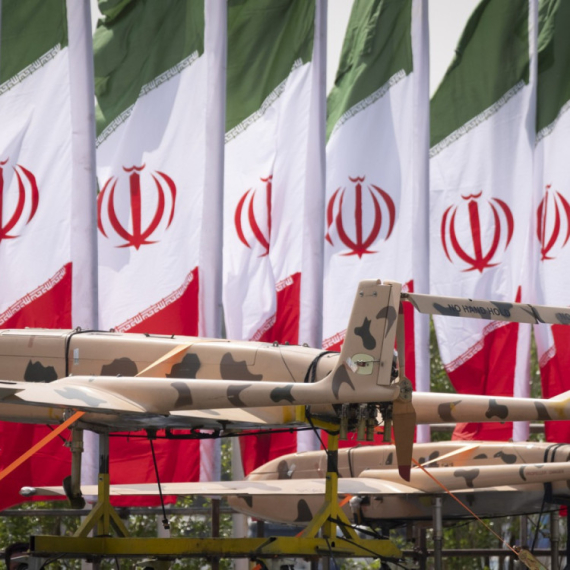HRW report: Serbia making limited progress
Human Rights Watch (HRW) NGO has published its latest annual report.
Friday, 01.02.2008.
13:07

Human Rights Watch (HRW) NGO has published its latest annual report. According to the report's findings, Serbia has made limited progress in the area of human rights, while the situation for minorities in Kosovo is still very difficult. HRW report: Serbia making limited progress The report says that certain progress has been made on the matter of human rights – the situation surrounding ethnic and religious minorities continues to be a matter of concern, while independent journalists still face threats and violence. According to HRW, Serbia has improved her cooperation with the Hague Tribunal, though it has still to arrest the main suspect, former commander of Bosnian Serb forces, Ratko Mladic. “War crimes suspect Ratko Mladic is still at large in Serbia, even though Belgrade has expressed its willingness to bring him to justice,“ says the report. The report adds that the Serbian media has a very negative view of the Hague Tribunal and its work, referring to the ongoing trials of former Yugoslav government and military officials. The War Crimes Court in Belgrade continues its work in spite of limited funds, political support and the awareness of its work, continues the U.S. human rights organization. “There have been reports on politics interfering with the prosecution’s work, but the sentence for the murder of Prime Minister Zoran Djindjic demonstrated bravery on the part of the prosecution and courts who, in spite of political pressure and threats, brought to justice 12 people, sentencing the chief accused Milorad Ulemek to 40 years,“ the report points out. HRW believes that limited progress has also been made in improving the situation of the Albanian minority in the south of Serbia and the Bosniaks in Sandzak, though also highlights the difficult economic and social conditions faced by Roma, who continue to be victims of abuse and physical attacks. “Over 30 attacks on members of the minority community were registered in 2007. The government usually condemned these attacks, the police launched investigations, but very few of the culprits were ever punished,“ says the report. With a high number of internally displaced (around 208,000) and refugees (around 106,000), Serbia has the highest number of displaced in Europe. Around 6000 displaced persons from Bosnia, Croatia and Kosovo are still housed in collective centers where conditions are very hard. Independent journalists face threats and attacks, and the report also cites the attack on Vreme journalist Dejan Anastasijevic and threats against Beta reporter Dinko Gruhonjic and TNT TV’s Stefan Cvetkovic. The report also states that no progress has been made in solving the murders of journalists Slavko Curuvija in 1999, and Milan Pantic in 2001. HRW says that “the Kosovo status process has overshadowed the dark state of human rights” in the province. Minorities continue to be faced with violence, harassment, discrimination and limited access to public services, says the report. Some progress has been made in the spheres of returns of displaced persons and refugees, though the justice system is weak. As far as the Kosovo parliamentary elections are concerned, many of the province’s Serbs heeded Belgrade’s call for a boycott, says the organization. Roma, Ashkali and Egyptians are still the most vulnerable and marginalized communities in Kosovo. In resolving Kosovo’s status, their political, economic and social demands have been neglected. Violence against minorities continues, the victims usually being Kosovo Serbs, but also Bosniaks, Roma, Croats and Montenegrins, states the report. The number of returns to Kosovo is still low . Only 308 were registered in the first half of 2007. The UNHCR, the report stresses, warned that Serbs, Roma and Albanians risked persecution if they returned to districts where they were in the minority. The justice system continues to be the weakest governmental organization and, in spite of attempts at reform, HRW believes that cooperation between international and domestic judges and prosecutors is insufficient
HRW report: Serbia making limited progress
The report says that certain progress has been made on the matter of human rights – the situation surrounding ethnic and religious minorities continues to be a matter of concern, while independent journalists still face threats and violence. According to HRW, Serbia has improved her cooperation with the Hague Tribunal, though it has still to arrest the main suspect, former commander of Bosnian Serb forces, Ratko Mladić.“War crimes suspect Ratko Mladić is still at large in Serbia, even though Belgrade has expressed its willingness to bring him to justice,“ says the report.
The report adds that the Serbian media has a very negative view of the Hague Tribunal and its work, referring to the ongoing trials of former Yugoslav government and military officials.
The War Crimes Court in Belgrade continues its work in spite of limited funds, political support and the awareness of its work, continues the U.S. human rights organization.
“There have been reports on politics interfering with the prosecution’s work, but the sentence for the murder of Prime Minister Zoran Đinđić demonstrated bravery on the part of the prosecution and courts who, in spite of political pressure and threats, brought to justice 12 people, sentencing the chief accused Milorad Ulemek to 40 years,“ the report points out.
HRW believes that limited progress has also been made in improving the situation of the Albanian minority in the south of Serbia and the Bosniaks in Sandžak, though also highlights the difficult economic and social conditions faced by Roma, who continue to be victims of abuse and physical attacks.
“Over 30 attacks on members of the minority community were registered in 2007. The government usually condemned these attacks, the police launched investigations, but very few of the culprits were ever punished,“ says the report.
With a high number of internally displaced (around 208,000) and refugees (around 106,000), Serbia has the highest number of displaced in Europe.
Around 6000 displaced persons from Bosnia, Croatia and Kosovo are still housed in collective centers where conditions are very hard.
Independent journalists face threats and attacks, and the report also cites the attack on Vreme journalist Dejan Anastasijević and threats against Beta reporter Dinko Gruhonjić and TNT TV’s Stefan Cvetković.
The report also states that no progress has been made in solving the murders of journalists Slavko Ćuruvija in 1999, and Milan Pantić in 2001.
HRW says that “the Kosovo status process has overshadowed the dark state of human rights” in the province.
Minorities continue to be faced with violence, harassment, discrimination and limited access to public services, says the report.
Some progress has been made in the spheres of returns of displaced persons and refugees, though the justice system is weak.
As far as the Kosovo parliamentary elections are concerned, many of the province’s Serbs heeded Belgrade’s call for a boycott, says the organization.
Roma, Ashkali and Egyptians are still the most vulnerable and marginalized communities in Kosovo.
In resolving Kosovo’s status, their political, economic and social demands have been neglected.
Violence against minorities continues, the victims usually being Kosovo Serbs, but also Bosniaks, Roma, Croats and Montenegrins, states the report.
The number of returns to Kosovo is still low . Only 308 were registered in the first half of 2007.
The UNHCR, the report stresses, warned that Serbs, Roma and Albanians risked persecution if they returned to districts where they were in the minority.
The justice system continues to be the weakest governmental organization and, in spite of attempts at reform, HRW believes that cooperation between international and domestic judges and prosecutors is insufficient


























































Komentari 2
Pogledaj komentare